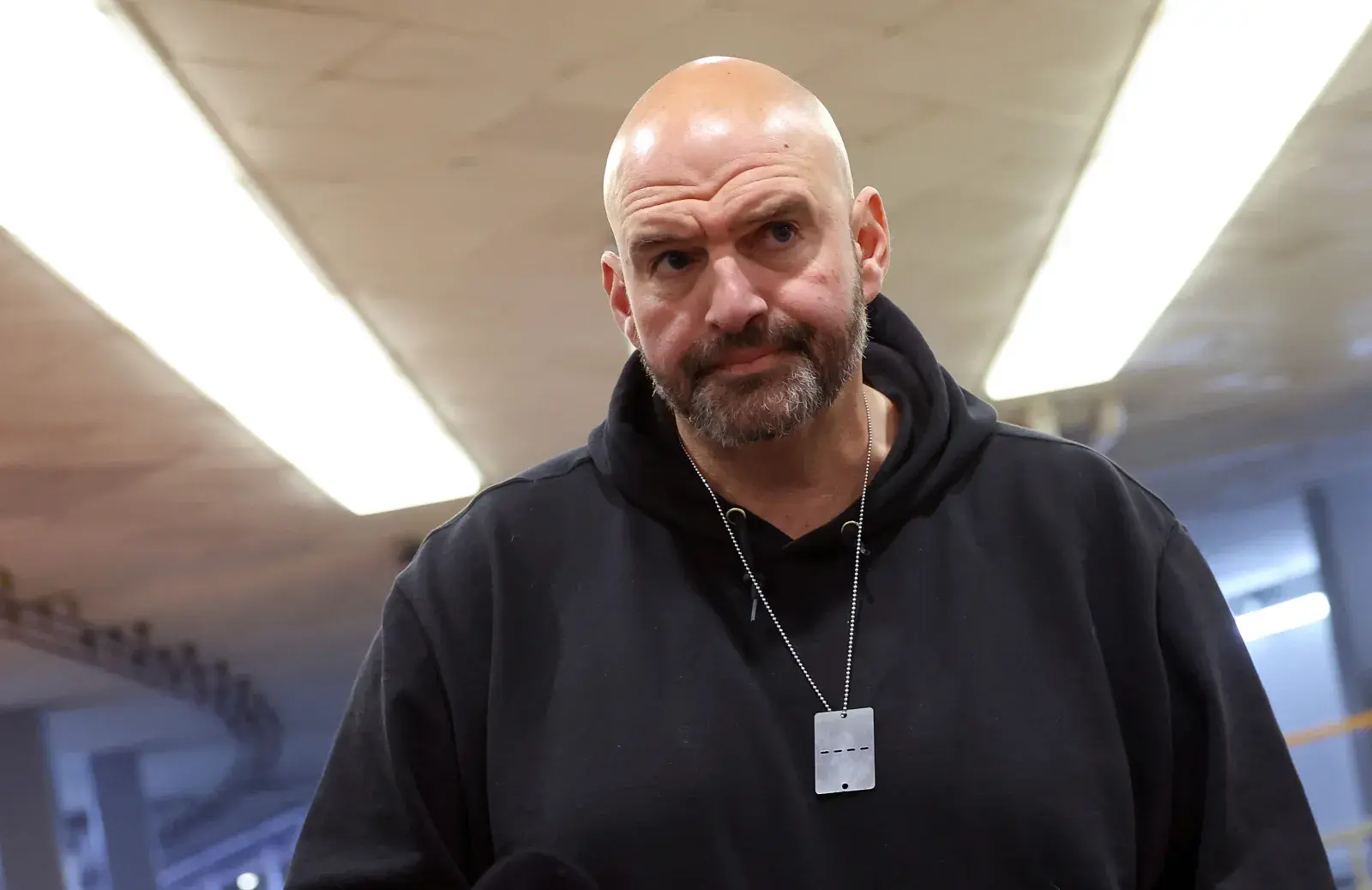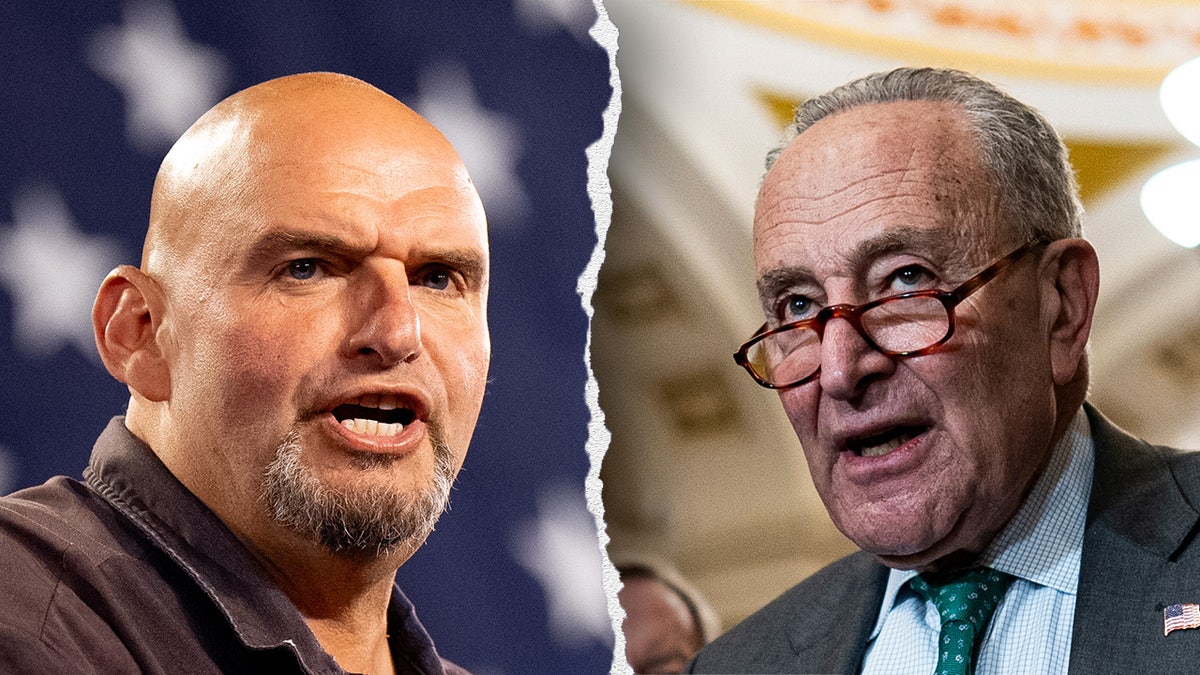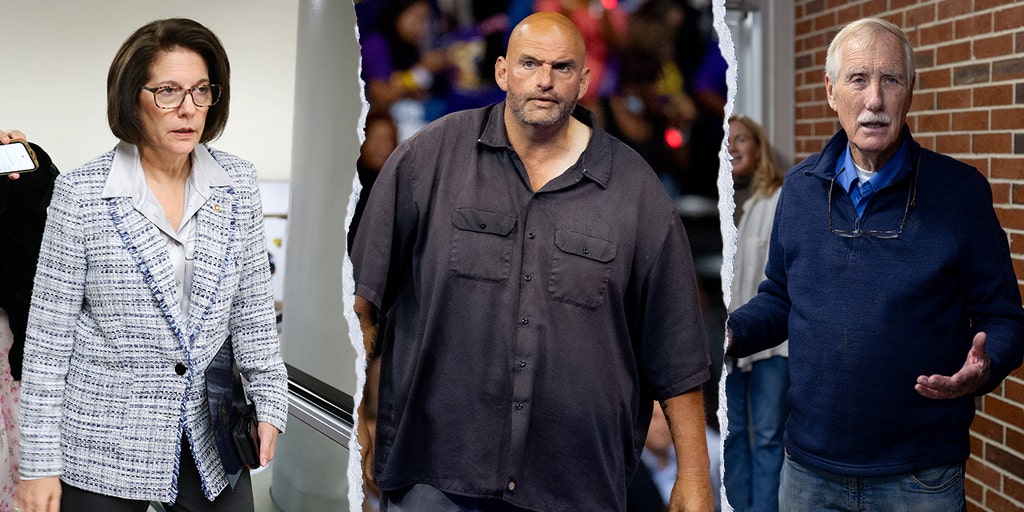
As the government shutdown continues into its fourth week, tensions are rising in Washington, and one senator is becoming an unlikely voice for change.
Senator John Fetterman of Pennsylvania, known for his laid-back style and independent streak, has suggested a bold move that could dramatically shift the balance of power in the Senate.
In a stunning break from party lines, Fetterman, a Democrat, has voiced support for Republicans using the “nuclear option” to eliminate the Senate filibuster in order to pass legislation to reopen the government.
Fetterman’s comments have sent shockwaves through the Democratic establishment, particularly as Senate Majority Leader Chuck Schumer (D-N.Y.) continues to hold firm on his approach to the shutdown.
While Schumer and his allies in the Senate have remained steadfast in their demand for concessions before agreeing to reopen the government, Fetterman’s suggestion to eliminate the filibuster represents a significant departure from the party’s traditional position.
Fetterman, who has earned a reputation as a maverick within the Democratic Party, has become increasingly vocal about his frustrations with the ongoing shutdown, which has now entered its historic 20th day.
As one of the longest shutdowns in U.S. history, it has had devastating effects on federal employees, essential government services, and the economy at large.
With no clear resolution in sight, Fetterman’s comments highlight the growing divide within the Democratic Party and the increasing urgency to find a solution.
In his remarks to reporters, Fetterman made it clear that he is willing to break with his party in order to take action and end the shutdown.
He expressed his support for the idea of using the “nuclear option,” a tactic that would allow the Senate to eliminate the filibuster—a procedural rule that requires a supermajority to pass most legislation—in order to pass a government funding bill.
The filibuster has long been a contentious issue in American politics, with Democrats and Republicans both using it to block legislation they disagree with.
The move to eliminate the filibuster would be a drastic step, as it would change the dynamics of the Senate and allow for a simple majority to pass bills without the need for 60 votes.
This would give the Democrats more leverage in negotiations, especially in situations like the current government shutdown, where a resolution requires swift action.
Fetterman’s suggestion to eliminate the filibuster has caught the attention of both Republicans and Democrats. While it is unlikely that a full-scale elimination of the filibuster will gain traction, the idea of using it to break the deadlock over the shutdown reflects the growing frustration with the current political gridlock.
Fetterman’s position also emphasizes the urgency of the situation, as he pointed out that vital programs like the Supplemental Nutrition Assistance Program (SNAP) are running out of funding, putting millions of Americans at risk.
Fetterman’s concerns about SNAP funding reflect the broader impact of the ongoing government shutdown on American families. As the government remains closed, essential services, including food assistance programs, have been severely limited.

SNAP, which helps millions of low-income Americans access food, is nearing the end of its financial stability, and Fetterman has warned that this could have dire consequences for his constituents, particularly those in Pennsylvania, where many families rely on these benefits to make ends meet.
“The people I represent, they need to eat. They don’t care about the politics in Washington. They need help,” Fetterman said, highlighting the disconnect between the political maneuvering in the Capitol and the real-world consequences for working-class Americans.
His blunt language contrasts sharply with the more polished rhetoric used by other Democratic leaders, including Vice President Kamala Harris, whose statements on the shutdown have been criticized for their lack of clarity and action.
The shutdown has already caused significant disruption for federal workers, many of whom have been forced to work without pay or have been furloughed.
For these workers, the shutdown is not just a political issue; it’s a financial crisis. Fetterman’s support for a solution that would reopen the government and provide immediate relief for these workers reflects his desire to move beyond partisan gridlock and address the pressing needs of the American people.
Despite Fetterman’s call for action, Senate Majority Leader Chuck Schumer has continued to hold firm on his position regarding the shutdown. Schumer has insisted that any funding bill must include provisions for expanding healthcare, protecting social programs, and addressing other policy priorities for Democrats.
While this approach has earned praise from his party’s progressive wing, it has also led to an impasse with Republicans, who argue that reopening the government should be the primary focus, with negotiations on policy matters to come later.
Schumer’s refusal to back a clean funding bill has drawn criticism from Republicans, who accuse him of using the shutdown as leverage to push through his political agenda.

The longer the shutdown continues, the more pressure Schumer faces to compromise and find a solution that will end the impasse. However, Schumer’s insistence on securing concessions before agreeing to a deal has made it difficult to break the deadlock.
For Fetterman, this political gridlock has become untenable. He has openly criticized Schumer’s approach, suggesting that the Democratic Party’s priorities should not come at the expense of American families.
By backing the nuclear option, Fetterman is signaling his willingness to take bold action, even if it means challenging his party’s leadership and the traditional political norms in the Senate.
Fetterman’s comments on the shutdown and the filibuster have added to his growing reputation as an independent voice within the Democratic Party.
While he remains firmly aligned with his party on many issues, Fetterman has increasingly distanced himself from party orthodoxy, particularly on matters related to fiscal policy and government spending.
His willingness to speak out against the Democratic leadership’s approach to the shutdown has earned him both praise and criticism from various factions within the party.
As a senator, Fetterman has consistently positioned himself as someone who is unafraid to challenge the status quo. His background as the former mayor of Braddock, Pennsylvania, a struggling industrial town, has shaped his political perspective, making him keenly aware of the needs and concerns of working-class Americans.
Fetterman’s pragmatic approach to politics, which includes his willingness to criticize his own party when necessary, has made him a standout figure in the Senate.

Despite his independent streak, Fetterman has made it clear that he has no intention of joining forces with Republicans to advance their agenda.
While he supports the idea of using the nuclear option to end the shutdown, he remains committed to his party’s broader goals, including expanding healthcare access and protecting social programs.
His comments reflect the growing division within the Democratic Party between those who want to prioritize immediate solutions, like reopening the government, and those who insist that policy changes must be part of any deal.
Fetterman’s support for using the nuclear option to eliminate the filibuster has reignited the ongoing debate over the role of the filibuster in the Senate.
The filibuster, which requires a supermajority of 60 votes to pass most legislation, has long been a tool used by both parties to block legislation they disagree with.
However, in recent years, both parties have increasingly called for reform or elimination of the filibuster, arguing that it has become a roadblock to legislative progress.
The idea of eliminating the filibuster has been met with resistance from some Senate Democrats, particularly those in swing states who fear that removing the filibuster would give Republicans unchecked power if they regain control of the Senate.
However, others, like Fetterman, see it as a necessary step to break the political gridlock and allow the Senate to pass critical legislation, including a funding bill to reopen the government.
The filibuster debate has become one of the most contentious issues in American politics, with many arguing that it is time to reform or abolish it in order to restore the Senate’s ability to function effectively.
Fetterman’s support for the nuclear option adds fuel to this debate, and it remains to be seen whether his position will influence other Democrats to reconsider their stance on the filibuster.
As the government shutdown enters its fourth week, the divisions within the Democratic Party are becoming increasingly apparent. On one side, you have Senate leaders like Chuck Schumer, who continue to push for a deal that includes significant policy concessions, particularly on healthcare and social programs.
On the other side, you have figures like Fetterman, who are calling for immediate action to reopen the government, even if it means breaking with party leadership.
The growing divide within the party presents a challenge as Democrats attempt to navigate the shutdown and find a resolution. While Schumer has remained steadfast in his position, Fetterman’s comments reflect the growing frustration among some Democrats with the slow pace of negotiations and the toll that the shutdown is taking on American families.
The question now is whether Fetterman’s call for the nuclear option will gain traction within the Senate and whether it will force Schumer to reconsider his approach.
The longer the shutdown continues, the greater the pressure will be on all parties to find a solution that addresses the immediate needs of the American people while also setting the stage for future policy negotiations.
As the government shutdown drags on, the stakes have never been higher for both parties. Fetterman’s suggestion to eliminate the filibuster and his support for working with Republicans to end the shutdown represent a bold and pragmatic approach to solving a crisis that has left millions of Americans in limbo.
Whether this call for change will resonate with his colleagues in the Senate remains to be seen, but it is clear that the political landscape in Washington is shifting, and Fetterman’s voice is one that will continue to shape the debate moving forward.

In the coming weeks, the pressure will continue to mount as Americans grow weary of the shutdown and demand a resolution. Whether Fetterman’s independent stance will spark meaningful change or further deepen the divisions within the Democratic Party is still uncertain.
However, one thing is clear: the battle over the future of the filibuster and the government shutdown will be a defining issue in the months to come.

